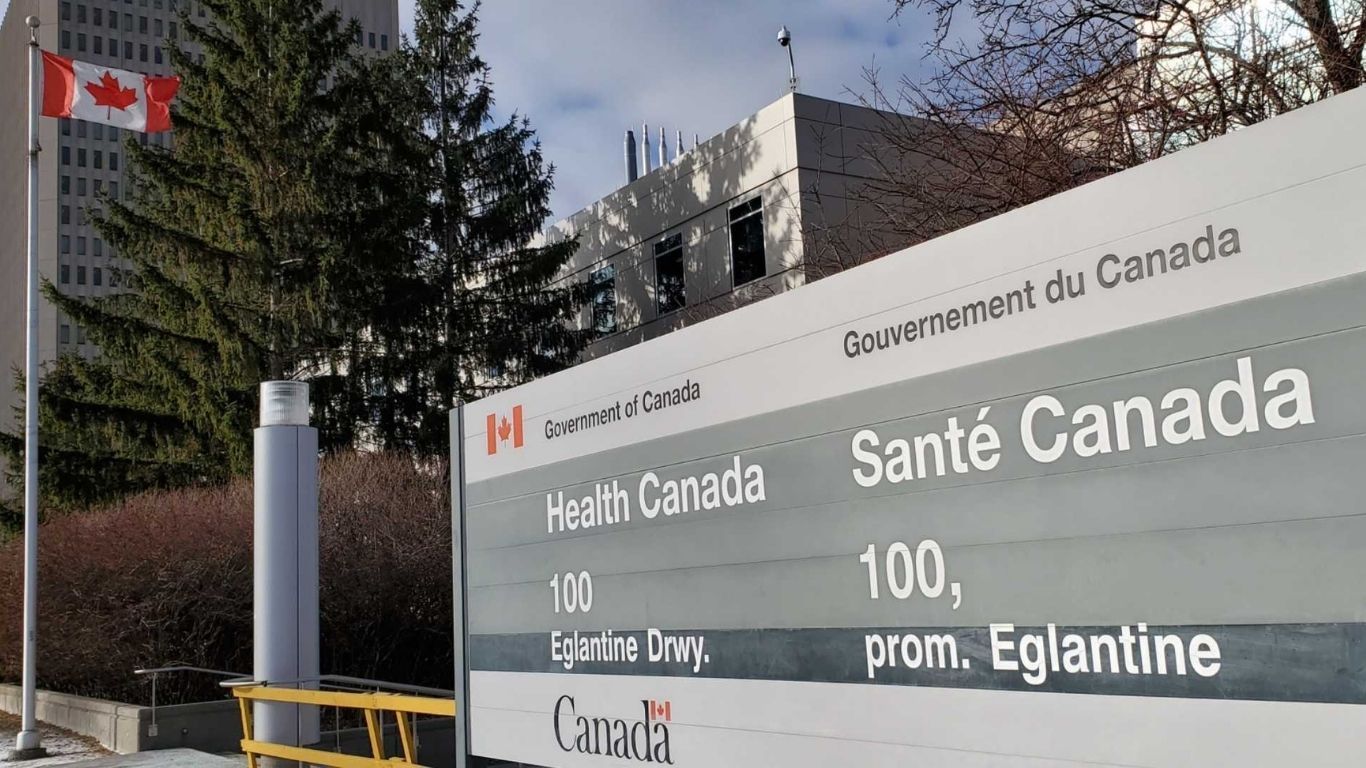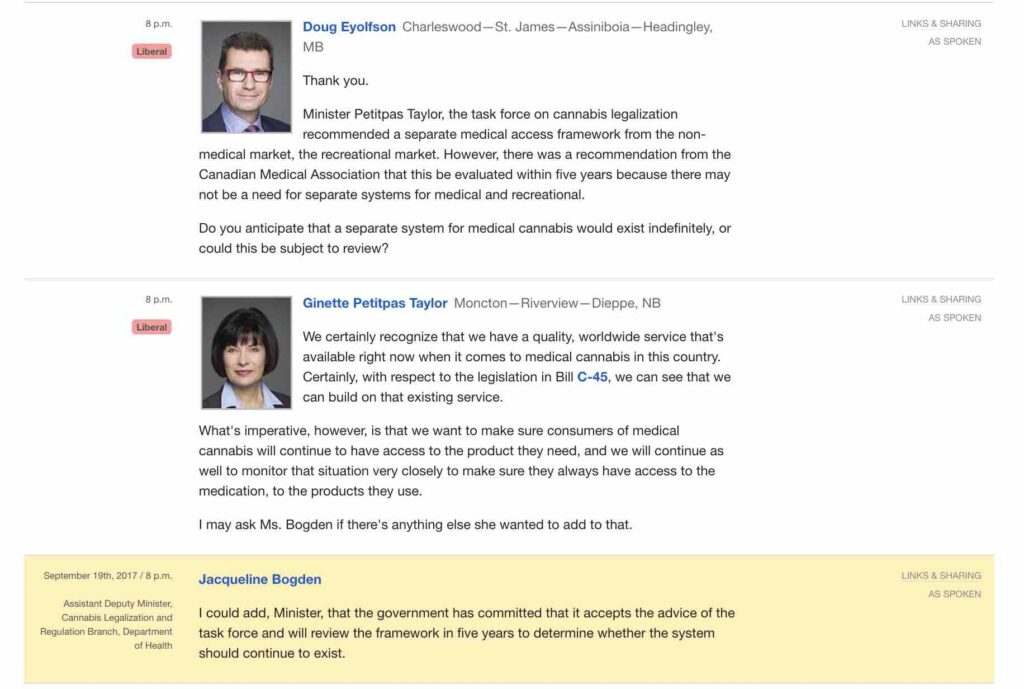
Advocates with a prominent medical cannabis organization say they are concerned that Health Canada is going back on their past commitment to undertake a review of the country’s medical cannabis access program in the wake of legalization.
Instead, they say the review appears to be wrapped into the currently ongoing review of the Cannabis Act, which came into force in October 2018—itself nearly a year behind schedule.
The concern, say several advocates who have long focussed on the legal medical cannabis framework in Canada, is that members of the current panel in charge of the review of the Cannabis Act do not seem to understand the nuances of medical cannabis in Canada.
When Canada legalized cannabis for non-medical purposes in 2018, the federal government, at the recommendation of its expert task force, maintained the separate medical access program. That same task force also called for an evaluation of that medical access framework within five years following legalization.
“Medical cannabis is healthcare, and it warrants the separate review that the Legalization Task Force recommended and the Ministry of Health accepted.”
Ashleigh Brown, Medical Cannabis Canada
The government further affirmed that commitment in a House of Commons Health Committee meeting in 2017, although notably did not mention a separate review of medical, but only a more general review after five years.
That expert panel, announced in late 2022, has been taking meetings with numerous cannabis advocates and industry experts in the last few months, with a goal of tabling a report on the overall impact of the Cannabis Act on Canadian society by spring 2024.
Jonathan Zaid, the vice-chairperson of Medical Cannabis Canada (MCC)—a national non-profit cannabis patient advocacy organization (formerly CFAMM, founded in 2014)—says he and his colleagues were surprised to hear from the panel recently that it was taking on the medical side of the review as well.
“It’s extremely concerning that Health Canada has quietly cancelled the dedicated five-year review of medical cannabis after multiple promises on record that it would be conducted. Patients expected and deserve a dedicated review with a more diverse panel that has patient representation and healthcare expertise.
“The dedicated five-year review was anticipated by stakeholders that differ from the recreational market, including patients, non-profits, and authorizing health care providers—all of whom are now caught by surprise that the dedicated medical review is cancelled,” he continued in a message to StratCann.
“Moreover, given the composition of the current review panel does not include patient representation, it is incumbent upon Health Canada to add further patient expertise to the current panel.”

Deepak Anand, the vice chairman of MCC, says he is concerned because he feels the membership of the current expert panel for the review of the Act is not informed about medical cannabis in Canada, and could potentially have a bias against the program and even the concept of cannabis for medical purposes.
“Obviously we would like to see a separate review take place for medical cannabis because we don’t believe the existing panel is qualified enough to understand the various nuances of the program or the reasons why patients are choosing to access medical cannabis, and even why medical cannabis currently exists, how it came about, and why it’s important for the future.”
Although Anand says he’s not sure what the intention is behind combining these two reviews, the idea that this could bode poorly for a separate medical system concerns him.
“The risk that it be dismantled completely is present, and I would say needs a dedicated panel of experts to review it, not one that might be doing this on the side of their desk and under the very different scenario that is the legalization of non-medical cannabis.”
“It’s extremely concerning that Health Canada has quietly cancelled the dedicated five year review of medical cannabis after multiple promises on-record that it would be conducted. Patients expected and deserve a dedicated review with a more diverse panel that has patient representation and healthcare expertise.”
Jonathan Zaid, Medical Cannabis Canada
StratCann reached out to Health Canada for comment on the issue, asking if they still intend to undertake a separate review of medical cannabis.
In response, a representative for the federal health agency did not directly address the question, but noted that the legislative review of the cannabis act “offers an opportunity to assess the progress towards achieving the goals of the Act, and to help ensure that the legislative framework is meeting the needs and expectations of Canadians. An Expert Panel is leading the review and will provide independent, expert advice to both ministers on progress made towards achieving the Act’s objectives and will help identify priority areas for improving the functioning of the legislation.
“One of the key areas of focus the Panel will explore is the impact of legalization and regulation of cannabis on access to cannabis for medical purposes.”
The health agency’s representatives also did not directly respond to a question about any possible intention they might have to dismantle the medical cannabis program, but noted that any regulatory changes to the Cannabis Act or Regulations as a result of the review would be pre-published in the Canada Gazette, Part I for further public consultation in accordance with the Treasury Board of Canada Secretariat’s Cabinet Directive on Regulation before regulatory changes are finalized.
Health Canada has listed no proposed changes to medical cannabis regulations within its Forward Regulatory Plan for 2022-2024.
Ashleigh Brown, another board member at Medical Cannabis Canada, echoes her fellow board members’ concerns about the need for an independent review of the medical cannabis program.
“The decision to forego a five-year review of the medical cannabis system in Canada comes as a shock to myself and so many other patients,” Brown tells StratCann. “We have been holding on since legalization in the hopes that medical cannabis access would be carefully examined and thoughtfully reformed to address the critical issues that patients face. Canada has never truly recognized cannabis as medicine with a dedicated system of access. The current regulations are a patchwork of guidelines and practices that are byproducts of hard-fought court cases, not deliberate and intentional legislation.
“We don’t believe the existing panel is qualified enough to understand the various nuances of the program or the reasons why patients are choosing to access medical cannabis, and even why medical cannabis currently exists, how it came about, and why it’s important for the future.”
Deepak Anand, Medical Cannabis Canada
“By foregoing the 5-year review of the current framework, we are, once again, sending the message that the medicine hundreds of thousands of Canadians rely on for relief, symptom control, and quality of life is an inconvenience to the federal government and not a valid or important therapeutic option. The stigma is pervasive, and it begins and ends with policy.
“The current review of the Cannabis Act is a massive undertaking, and I respect the work that the Ministry of Health and the Independent Panel are putting into this public consultation and review. The scope is broad, and the task is unprecedented: the impact of legalization on public health warrants this level of swift and thorough consideration.
“However, public health isn’t healthcare. Medical cannabis is healthcare, and it warrants the separate review that the Legalization Task Force recommended and the Ministry of Health accepted. As advocates, we have been told over and over that the separate review was the opportunity to make meaningful changes to the medical cannabis system of access. It was also the reason that the system was left relatively untouched in 2018: we were told that change would come once the dust settled on legalization.
“I hope that the Ministry of Health will reconsider their decision and work with patient advocates and allies to design a separate regulatory review with a transparent, reasonable engagement plan that acknowledges the real barriers we face—we don’t have the funds, the time, or the privilege to move at the pace that other stakeholders can. We are tired, but we are still here. I want to make sure that patients aren’t a casualty of policy yet again and that Canada learns from decades of the lived experience of people with illness and disability. Affordable, reasonable, inclusive access begins with the recognition that medical cannabis is healthcare, and access to healthcare is a fundamental right that we can work together to protect and improve upon. It isn’t too late. “

































